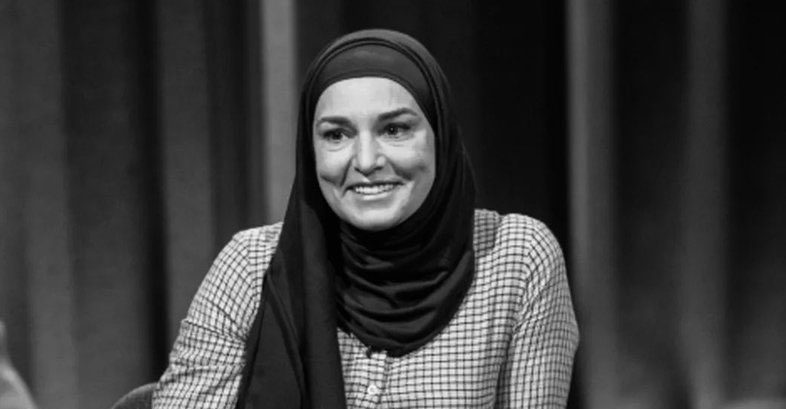The renowned musician converted to Islam in 2018 and changed her name to Shuhada Sadaqat, though continued to perform under the name Sinead O’Connor.
News reports detailing the death of Muslim icon and singer Sinead O’Connor have largely ignored the late artists’ religion, fans highlighted.
The Irish singer and songwriter Sinead O’Connor, known for her stirring voice, died at the age of 56, as confirmed by members of her family.
“It is with great sadness that we announce the passing of our beloved Sinead. Her family and friends are devastated and have requested privacy at this very difficult time,” Irish national broadcaster RTE quoted a statement from the singer’s family on Wednesday.
However, news of her death by Western publications has been slammed by fans of the artist as she has been illustrated without the hijab, which she adopted after converting to Islam, and without mention of her religion.
“Sinead O’Connor became Muslim in 2018 and wore a headscarf like Muslim women do. Media: Let’s disrespect her decision and plaster her pre Islam images everywhere,” one user wrote, slamming publications like BBC who have circulated the images of O’Connor without her hijab.
“Interestingly some people use old pictures of Sinead O’Connor avoiding to use her photos with hijab after she reverted. That makes me wonder why they choose to avoid something she chose herself. If you wanna honor her respect her beliefs,” another user wrote.
In 2018, O’Connor accepted Islam and changed her name to Shuhada Sadaqat, though continued to perform under the name Sinéad O’Connor.
“This is to announce that I am proud to have become a Muslim,” she wrote on Twitter in October 2018. “This is the natural conclusion of any intelligent theologian’s journey. All scripture study leads to Islam. Which makes all other scriptures redundant.”
In a later interview on Ireland’s The Late Late Show, she delved deeper into her journey to Islam.
“I started studying scriptures from different religions, trying to find the ‘truth’ about God… I never thought I would join a religion, but I left Islam until last because I had so much prejudice about Islam,” she said.
“But then when I started reading, and I read just chapter two alone of the Quran, and I realised, ‘Oh my God, I am home’,” she said. “I had been a Muslim all my life and didn’t realise it.”
Globally O’Connor is known for her worldwide hit ‘Nothing Compares 2 U,’ O’Connor’s death has stunned the music industry and her native Ireland.
“The world has lost an artist with the voice of an Angel. Ireland has lost an iconic voice and one of our absolute finest, by a long shot. And I have lost a friend. Sinead’s music will live on and continue to inspire! Rest In Peace, Sinead you are home with your son I am sure,” tweeted former Irish Ultimate Fighting Championship Featherweight Conor McGregor.
O’Connor’s death comes months after her 17-year-old son Shane died of alleged suicide.
Remembered as among the most fearless activists of the late 20th century, several fans have voiced how inspiring O’Connor was.
“The biggest impression Sinéad O’Connor made on me was her performance at the Bob Dylan tribute show a few days after she ripped up the pope’s pic on SNL. She doubled down on her criticism of the church even while being booed by all of Madison Square Garden – she was 26 & so brave,” one social media wrote on Twitter.
Qatari social media users paid their tributes towards O’Connor, remembering her as an individual with humbleness and intelligence.
“Indeed, we belong to Allah, & to Him we shall return. #SineadOConnor journey’s inspired me. She courageously confronted hardships& injustice & was able to embrace the truth & liberate her spirit with humbleness & intelligence. Her stances are now history to be learned from. RIP,” the user wrote.
However, the musical icon attracted controversy and divided opinions worldwide during her music career.
In 1992, O’Connor tore up a photograph of Pope John Paul II on the Saturday Night Live US television programme in protest against child sex abuse in the Catholic Church.
In addition, O’Connor refused to play the US national anthem before her concerts and boycott Grammy Awards, voicing her belief “to be part of a world that measures artistic ability by material success.”
The circumstances of her death remain unclear. O’Connor is survived by her three children.







